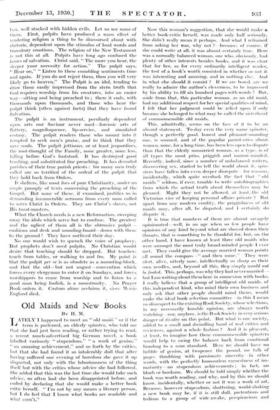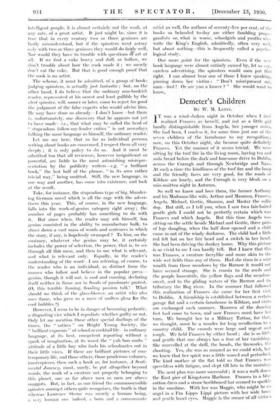Old Maids and New Books
By H. M.
LATELY I happened to•meet an " old maid," or if the term-is preferred, an elderly spinster, who told me that she had just been reading, or rather trying to read, a recent much-advertised big German novel, a -book labelled variously " stupendous," " a work of genius," " an amazing achievement," and so forth by the critics, but that she had found it so intolerably dull that after having suffered one evening of boredom she gave it up disgusted, not only with the laboriousness of the thing itself but with the critics whose advice she had followed. She added that this was the last time she would take such advice, so often had she been disappointed before, and ended by declaring that she would make a better book critic herself. "I'm not by any means a literary person, but I do feel that I know what books are readable and what aren't." Now this woman's suggestion, that she would make a better book-eritie herself, was made only- half seriously. She didn't really mean it perhaps. And what 1 refrained from asking her was, why not ?—beeause, of course, if she could write at all, it was almost certainly true. Ilere was a normally balanced woman, one who, obviously. had plenty of other interests besides books, and it was clear that for her, as for every ordinarily intelligent reader, the test of a book's worth consisted in whether or not it was interesting and amusing, and in nothing else. And in what else should it consist ? If we are bored, are we really to admire the author's cleverness, to be impressed by his ability to fill six hundred pages with words ? But, aside from that, this particular woman, as an old maid. had my additional respect for her special qualities of mind. I felt that her judgment could be relied upon if only because she belonged to what may be called the sisterhood of commonsensible old maids.
This, admittedly, seems on the face of it to be an absurd statement. To-day even the very name spinster, though is perfectly good, honest and pitasant-sounding one, is scorned, and of the popular parrot-eries about women, none. for a long time, has been less open to dispute than that the elderly unmarried woman, as a type. is of all types the most prim, priggish and narrow-minded. Recently, indeed, since a number of unbalanced w riters, dismwering sex, started to tell the world about it. spin- sters have fallen into even deeper disrepute -•- for reasons, incidentally, which quite overlook the fact that ohl maids " seldom, if ever, trouble to write autobiographies Irons which the actual truth about themselves may be gleaned. Might they not be allowed, at least. the old Victorian vice of keeping personal affairs private ? But apart from any modern crudity, the priggishness of old maids may, after all, be disputed, and I certainly do dispute it. It is true that numbers of them are almost savagely opinionated—well, in an age when so few people have opinions of any kind beyond what arc shoved down their throats, that is something to be thankful for, but, on the other hand, I have known at least three old maids who were amongst the most truly broad-minded people I ever met. They could give the average married woman points ull round the compass—" and then some." 'limy were alert_ alive, utterly sane, intellectually as sharp as their own needles, and, beyond all this, they simply would not be fooled. This, perhaps, was why they had never married— but I am writing about them here in connexion with books. I really believe that a group of intelligent old maids, of this independent kind, who mind their own business and only ask that other people should mind theirs, would make the ideal book selection committee —in this I mean no disrespect to the existing Book Society, whose selections, in my necessarily humble opinion, arc always worth watching --nor, anyhow, is the Book Society itt very serious danger of rivalry on this point. But what is one society,
added to a small and dwindling band real critics and reviewers. against a whole fashion ? And it is pleasant, at least, to imagine how these commonsensible spinsters would help to swing the balance back from emotional humbug to a sane standard. Here we should have no babble of genius, at twopence the pound, no talk of pages throbbing with passionate sineerity---in other words, with the perfectly humourless earnestness of im- maturity—no stupendous achievements ; in fact, no blurb or bunkum. We should be told simply whether the book was worth reading, and why, and by this we should know. incidentally, whether or not it was a work of art. Because, however stupendous, shattering, world-shaking a new book may be, if it is still dull, pretentious and tedious to a group of wide-awake, perspicacious and
intelligent people, it is almost certainly not the work, at . any rate, of a great artist. It just might be, since it is true that in every century two or three geniuses are badly misunderstood; but if the spinsters went astray only with two or three geniuses they would do fairly. well Nor would they have to trouble with questions & art at all. If we find. a cake heavy: and dull, or hollow, we don't trouble about how the cook made it ; we Merely'. don't eat the cake. But that is good enough proof that he cook is no artist. The scheme, it must he admitted,. of a group of .13Ook-1 judging spinsters, is actually just fantastic ; but, on the other hand, I do believe that the ordinary non4sookish reader, represented at his sanest and least gullible by the. alert spinster, will, sooner or later, come to reject for good the judgment of the false experts who would advise him.;. Ile may have done so already—I don't know—but there. is. unfortunately, one discovery that he appears not yet to have made ---,i.e., that what may be called the herd of 7 st upendous follow-my-leader critics ", is not nowadays. talking the same language as himself, the ordinary reader: Let me say here, that so far as individual - persons writing about books are concerned, .I respect them all very, deeply ; it is only policy to do so. And it must be admitted too that all reviewers, however insignificant or powerful, are liable to the most astonishing misrepre- sentation by the publicity writers—e.g, " a brilliant book," the last half of the phrase, " in its own rather trivial way," being omitted. Still, the new language, in one way and another, has come into existence, and look at the result.
Take, for instance, the stupendous type of big, blunder- - Mg German novel which is all the rage with the adver- tisers this year. This, of course, in the new language, falls into the work-of-genius category right away; the number of pages probably has something to do with it: But since when, the reader may ask himself, has genius consisted in the ability to manufacture bulk, to shove down a vast mass of words and sentences in which the story, if any, is hopelessly swamped ? To him, on the contrary, whatever else genius may be, it certainly includes the power of selection, the power, that is, to see. through all this mess, and then to use what is relevant, and what is relevant only. Equally, in the reader's understanding of the word—I am referring, of course, to the reader who is an individual, as distinct from the masses who follow and believe in the popular press— genius, though it will out, is cool and cunning, declaring itself neither in flame nor in floods of passionate protest. (0, this terrible flaming, flooding passion talk ! What should we think of the glass-blower, an artist who also uses flame, who gave us a mess of molten glass for the cool bubbles ?)
However, I seem to be in danger of becoming pedantic, a disgusting vice which I repudiate whether guilty or not. Only let me mention those other special darlings of the times, the " satires " on Bright Young Society, the " brilliant exposure" of school or cocktail life—in ordinary language, at its best, competent reporting without is spark of imagination, at its worst the " yah boo snubs " attitude of a little boy who finds his schoolmates out its their little vices. If •these are brilliant pictures of cols- temporary life, and those others, those ponderous volumes, . masterpieces, then such a book as, for instance, A Senti- mental Journey, must, surely, be put altogether beyond words, the work of a creature not properly belonging to this planet, one its far above men as men are above maggots. But, in fact, as our friend the commonsensible spinster amongst others quite recognizes, the truth is that whereas Laurence • Sterile wits' merely a human- being,' • a %Try human one indeed, a bom and is consummate
artist as well, the authors of seventy-five per cent, of the books so bdauded to-day are either funibling propa- gandists or, what is worse; schoolgirls and youths wlei write the King's English; admittedly, often very well, but about nothing -this is frequently called a psycho- logical study. • • -
One more .point for the 'spinsters. . Even if the new hook language were almost entirely .caused by, let us say, careless advertising, the spinsters: would Soon put this right: I can almost hear one of those • I knew speaking, pinithig down her Victim ." Don't misrepresent me, !: Or lire.you a' knave ? " She would want to
know. • •















































 Previous page
Previous page